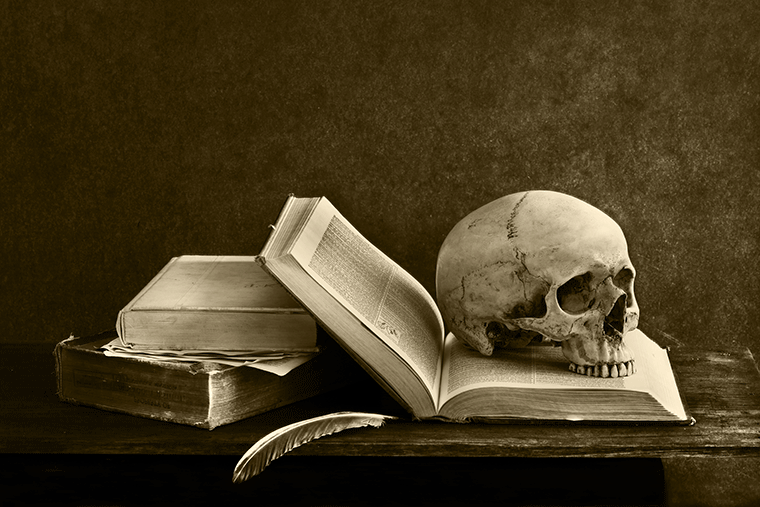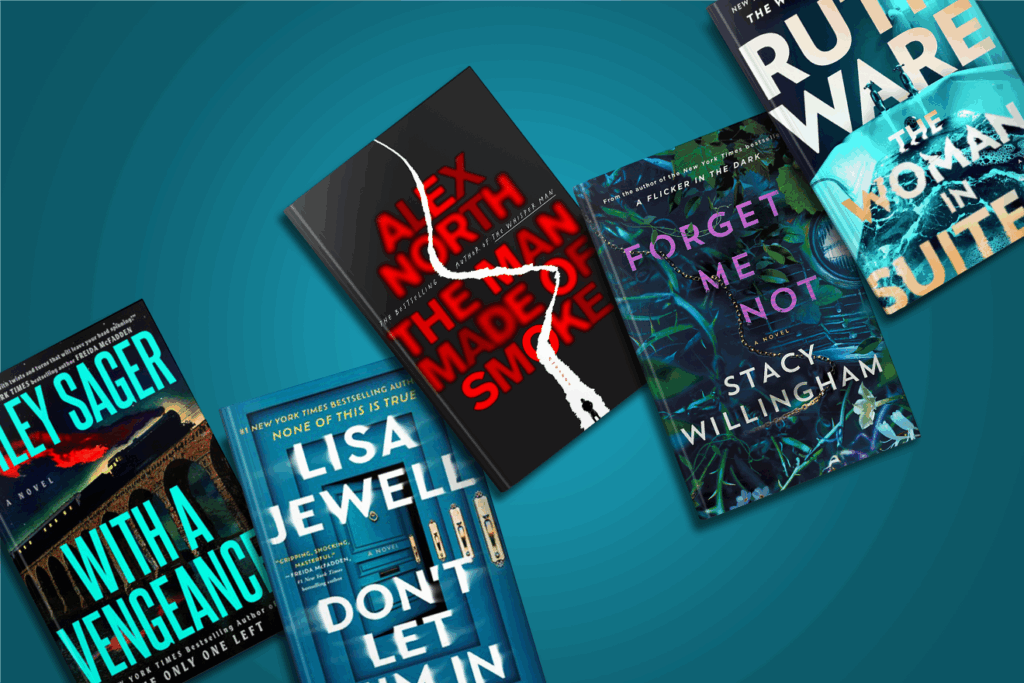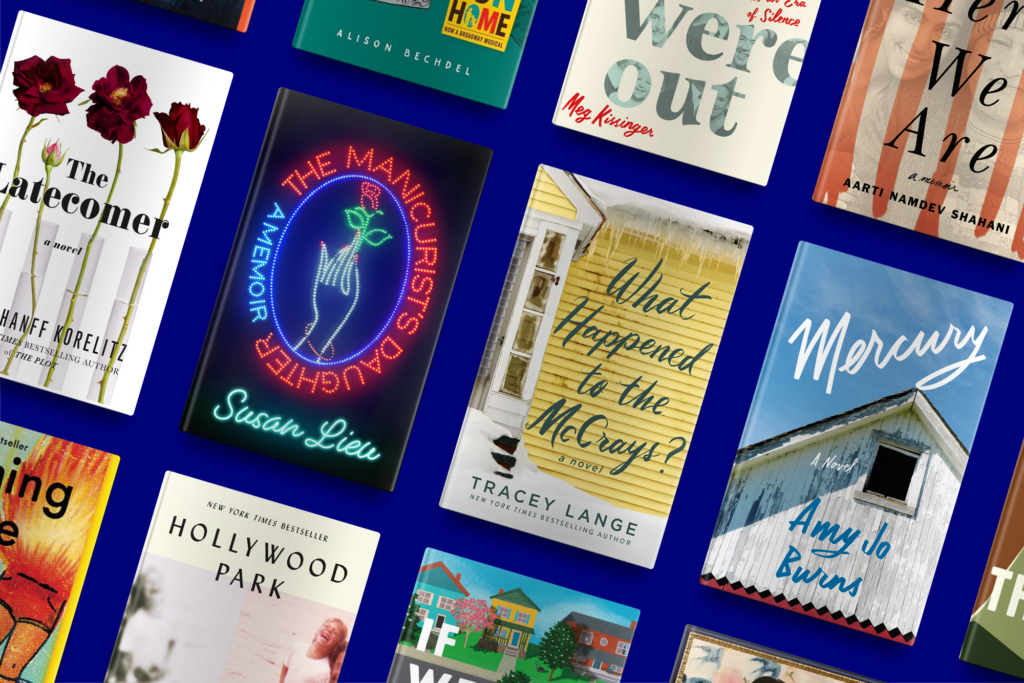These twisted reads are designed to mess with your head.
We love psychological thrillers for their dark atmosphere, mind-bending plots, and jaw-dropping twists. Here’s a look at what defines a psychological thriller, how the subgenre evolved into its own bestselling beast, and the types of psychological thrillers you can expect to find on bestseller lists, from nightmarish chillers, like Alex North’s The Whisper Man, to twisty tales of psychological suspense, such as Jean Hanff Korelitz’s The Plot or Alex Michaelides’ The Silent Patient.
Definition of a Psychological Thriller
Thrillers are a diverse type of fiction but share many of the key characteristics of mystery fiction. There’s a conflict — often arising from a crime or a suspicious act, such as a robbery, a murder, or a disappearance. The plot then drives toward solving this conflict. As a result, thrillers are suspense-filled, edge-of-your-seat narratives, with characters motivated by fear, paranoia, or a thirst for vengeance.
Readers interested in thrillers will find a wide array of subgenres at their fingertips. Crime thrillers focus on the inner workings of criminal investigations; legal thrillers take place in the courtroom or behind the closed doors of powerful institutions; adventure thrillers track a hero on a life-changing journey; spy thrillers draw you into a high-stakes game of international secrecy.
Psychological thrillers possess a different central characteristic, one that may be present in the subgenres mentioned above but is not the driving force behind their stories.
What sets a psychological thriller apart is its commitment to exploring the darkest corners of the human mind. Narratives are told from the point of view of an unreliable narrator or a psychologically stressed character. They feature protagonists and antagonists driven by obsession or violence, with an emphasis on internal tension and conflict. Within every psychological thriller, the core mystery is crystalized by the inner workings of a disturbed mind.
Origins of the Psychological Thriller
The beginnings of the thriller genre can be traced all the way back to texts like One Thousand and One Nights, a collection of Middle Eastern folk narratives compiled during the Islamic Golden Age that contains tales of mysterious murders, courtroom drama, and haunted houses. One of the earliest precursors to the modern literary thriller is James Fenimore Cooper’s The Spy (1821), in which an American agent operates in British territory during the Revolutionary War.
The psychological thriller, meanwhile, is the result of a unique historical shift inward, toward the secrets of the human mind. Enlightenment thinkers of the 17th and 18th centuries endeavored to draw society’s focus away from superstition and toward science, knowledge, and human behavior. But perplexing mysteries remained: How do I truly know the person sitting beside me? How do I truly know myself?
As philosophers wrestled with such heady topics, so too did artists, poets, and novelists. Among them was Edgar Allan Poe (1809–1849), viewed by many as a father of the psychological thriller. Poe’s poems and short stories plumb the depths of psychological dread — one classic example is “The Pit and the Pendulum,” which centers on an unnamed prisoner fighting to maintain his sanity as he endures the escalating torments of the Spanish Inquisition. The bleakest of the American Romantics, Poe invites us to experience the terror and anxieties that reside within through his tales of buried secrets, nefarious schemes, people plagued by trauma, and characters being buried alive.
Speaking of secrets, Sigmund Freud’s psychological research at the dawn of the 20th century played a key role in establishing the tensions we now associate with psychological thrillers. Freud believed that the Self is split into three psychological realities with competing motives. The anxiety or discomfort we experience is caused by trying to reconcile these conflicting impulses. Works like The Interpretation of Dreams (1899), The Psychopathology of Everyday Life (1901), and Civilization and Its Discontents (1930) laid out Freud’s vision of the desires, conflicts, and motivations roiling within us. They also paved the way for greater psychological depth in modern-day fiction, from heated noir thrillers like James M. Cain’s The Postman Always Rings Twice (1934) to Patricia Highsmith’s Strangers on a Train (1950), about two men who become entangled in a doomed double-murder plot.
Today, psychological thrillers feature a wide array of fiendish plots, settings, and scenarios. And yet, like Poe’s work from more than a century ago, psychological thrillers still seek to unlock the secrets of our darkest impulses and fears.
Types of Psychological Thriller
Domestic Psychological Thrillers are the most popular type of psychological thriller. The setting is familiar, and the characters lead everyday lives — but something occurs that throws everything into disarray. The Girl on the Train (2015) by Paula Hawkins follows a woman who witnesses something shocking from her train car window and decides to get involved. In Gillian Flynn’s Gone Girl (2012), Amy and Nick Dunne’s seeming domestic bliss is turned inside out when Amy disappears without a trace and neighbors suspect Nick is behind it all. In Swedish thriller writer M. T. Edvardsson’s A Nearly Normal Family (2019), a teenage girl is accused of murdering a much older man, and her parents — a pastor and a defense attorney — have to decide how far they are willing to compromise their careers and morals to keep their family together.
Dark Psychological Thrillers are defined by their heightened sense of menace and dread. Antagonists are often serial killers or deeply disturbed individuals, while protagonists can be worn-out investigators or ordinary individuals who find themselves trapped in a violent situation. In Thomas Harris’s The Silence of the Lambs (1988) — the sequel to Harris’s Red Dragon (1981) — FBI Special Agent Clarice Starling enters into a dangerous psychological game with convicted cannibal killer Dr. Hannibal Lecter as she hunts down an elusive murderer known as Buffalo Bill.
In The Maidens (2021), by Alex Michaelides, an alumna of Cambridge University is convinced that a popular Greek tragedy professor is behind the unsolved murder of a student in his secret society. When a second body is discovered, she must decide how much she’s willing to risk to stop a potential serial killer.
Tana French’s In the Woods (2007), the first novel in her acclaimed Dublin Murder Squad series, follows an investigator with a disturbing past who’s faced with a child murder case that’s eerily similar to the unsolved events of his childhood.
Workplace Psychological Thrillers take place in the working environment or the professional sphere. Characters often risk their life’s work — along with their lives — to solve a mystery or escape persecution. The Plot (2021), by Jean Hanff Korelitz, features a creative-writing professor who steals a student’s manuscript, with terrifying consequences. Alex Michaelides’ blockbuster thriller The Silent Patient (2019) follows a psychologist striving to break through to a troubled patient who was a successful painter before she fatally shot her husband and then stopped speaking entirely.
Sometimes the all-too-human dramas that play out in the workplace allow for flashes of satire or wicked humor. In The Other Black Girl (2021), for instance, Zakiya Dalila Harris combines suspense with biting social satire as she examines the very real dangers of privilege and racism in the modern publishing world.
Supernatural Psychological Thrillers draw on the paranormal and the occult in their chilling narratives. In Alex North’s The Whisper Man (2019), a grieving father can’t escape the twisted terrors that still haunt his hometown. North’s follow-up thriller, The Shadows (2020), set in the same fictional world as The Whisper Man, unravels the mystery of two teenage boys who committed an unspeakable crime after dabbling in lucid dreaming. When one of the boys vanishes into thin air, those left behind are haunted by the tragedy he left behind. In Simone St. James’s The Broken Girls (2018), a journalist seeks to uncover the haunting secrets of a forsaken boarding school in Vermont.
Psychological Thriller Adaptations
Psychological thrillers are packed with plot twists and chilling portraits of humanity, so it’s no surprise that they make for captivating movies and TV shows. Try cracking open Stephen King’s Misery without seeing Kathy Bates’s Annie Wilkes looming over the foot of your bed. And who else but Sir Anthony Hopkins from The Silence of the Lambs could so chillingly describe the culinary delights of liver, fava beans, and a nice Chianti?
More recently, thrillers like Gone Girl and Behind Her Eyes have wowed audiences with their flawed characters, compelling narratives, and shocking twists. Psychological thrillers get tapped for adaptation frequently, so be on the lookout for shows based on Liane Moriarty’s Nine Perfect Strangers (Hulu) and Caroline Kepnes’ You Love Me (Netflix), as well as movies based on Patricia Highsmith’s Deep Water and Alex Michaelides’ The Silent Patient.
Curious to learn more about literature? Check out our in-depth companion features: What Is Nonfiction?What Is a Mystery?What Is a Biography?, and What Is a Memoir?



